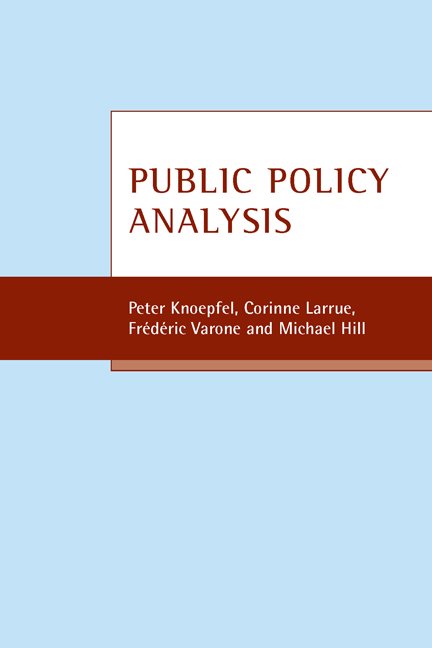five - Institutional rules
Published online by Cambridge University Press: 14 January 2022
Summary
In Chapter Two we outlined the reasons why we believe it necessary to analyse the institutional rules that frame the interaction of policy actors. In this chapter we discuss how analysts working in the social sciences have explored the influence of institutional rules on individual behaviour and on public policies. We then present the definitions of institutions proposed by the different neo-institutionalist schools, as well as the various hypotheses that have been formulated to explain these institutional changes. Having completed this review of the literature, we then operationalise the concept of institutions so that it is directly applicable to the analysis of specific public policies.
5.1 Institutional analysis
5.1.1 From institutionalism to neo-institutionalism
Contemporary political science has been dominated by three successive paradigms dealing with the role of institutions. These paradigms are important for understanding the influence of institutional rules on the behaviour of actors and, consequently, on public policies. The traditional institutionalist paradigm assumes that democratic institutional rules determine individual and collective decisions. Homo politicus ‘makes policy’, but always in the context of constitutional institutions and in accordance with formal rules. The political scientist describes – mostly in legal language – the structures and procedures of the organs of parliament, government and the administration as well as the functioning of political parties and interest groups. However, traditional institutionalism gradually devoted itself to the identification of the legal aspects and organisational structures of (informal) rules that relate to collective decision making (Duverger, 1968, pp 7-8; Chevallier, 1981, pp 3-61).
Making a fundamental change from that paradigm with respect to the selected unit of analysis, the behaviourist paradigm assumes that the social roles, informal norms and personal values of individuals determine their political behaviour. In its more radical version, institutions are defined as ‘empty shells’ (Shepsle, 1989, p 133). The paradigm of rational choice (for example, public choice and game theory) interprets political actions by applying the theories and methods of neo-classical economics. According to this approach, the field of politics corresponds to a market; collective decisions represent the equilibrium resulting from the aggregation of individual behaviour. Homo oeconomicus makes strategic political choices that aim to maximise personal utility (material and immaterial). The institutional arrangements do not influence the formation of individual preferences but may channel them and constitute a means of resolving collective action dilemmas (for example, ‘free-riding’, ‘the prisoner's dilemma’ and ‘the tragedy of the commons’).
- Type
- Chapter
- Information
- Public Policy Analysis , pp. 91 - 110Publisher: Bristol University PressPrint publication year: 2007



